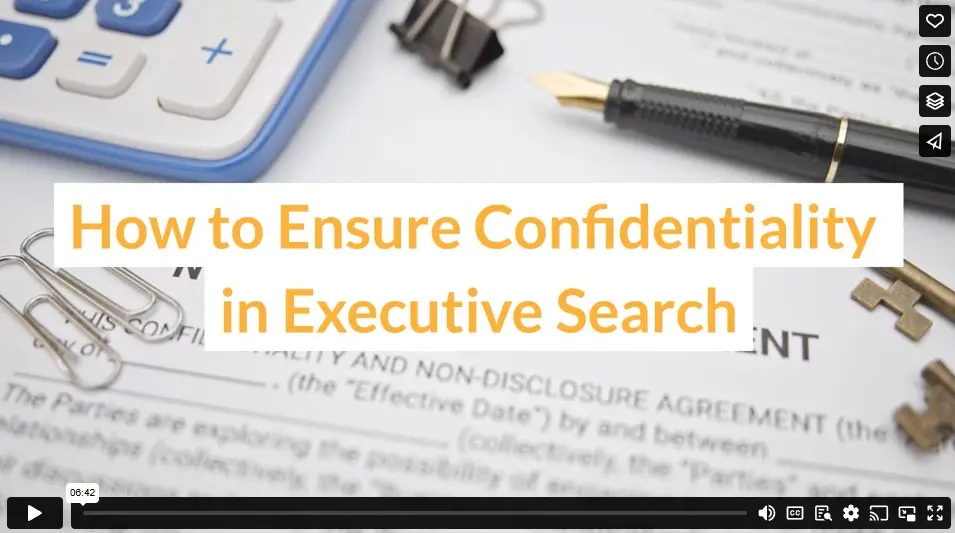When you’re looking to fill a critical executive role, maintaining confidentiality isn’t just a preference—it’s a necessity. You’re not simply replacing a team member; you’re managing sensitive business information, leadership dynamics, and often high-stakes transitions. If you don’t take the right precautions, your executive search can quickly lead to leaks, rumors, or even damage to your internal culture and external brand. That’s why you need a plan to protect the entire process from day one.
Confidential executive searches are especially common when you’re replacing an underperforming leader, making strategic shifts, or preparing for a merger or acquisition. In these situations, premature exposure can create uncertainty among stakeholders. It can also weaken internal morale and spark concerns from investors, partners, or customers. It’s your job to manage this transition with discretion—and that starts with knowing how to lock down your search process.

Table of Contents
ToggleUnderstand What’s at Stake
Confidentiality isn’t just about keeping things quiet. It’s about protecting your organization’s reputation and ensuring the executive search process doesn’t cause internal friction or external backlash. If your current leadership team finds out through the grapevine that someone’s being replaced, you risk damaging trust—even if the change is ultimately for the better.
Think about what could happen if word gets out before you’re ready: competitors might try to poach top talent, employees may speculate and disengage, or clients might worry about instability at the top. That kind of distraction can quickly derail your operations. By taking a proactive approach to privacy, you ensure that your leadership transition is professional and that it happens on your terms.
Work with a Trusted Search Partner
One of the best decisions you can make is to partner with a retained executive search firm that specializes in confidential placements. These firms are equipped to manage high-stakes hiring with discretion. You want someone who understands not only the importance of confidentiality but also how to structure every touchpoint in the process to avoid exposure.
When you partner with a search firm, be upfront about your need for confidentiality. Ask how they manage external outreach and candidate communication. Make sure they don’t list the role publicly or distribute your company name widely. Some firms even use blind postings to attract interest without revealing too much detail too soon.
It’s also important to clarify how the firm will vet candidates without jeopardizing their current positions. Top-tier talent isn’t always actively looking—and revealing their interest in your opportunity can be just as risky for them. Your search partner should protect the candidate’s privacy just as carefully as your own.
Create a Confidential Internal Team
You can’t run a confidential search if everyone on your team is in the loop. Before launching the process, determine exactly who will be involved and what they need to know. Your inner circle will likely include your CEO, board members, or key stakeholders, but it shouldn’t include a wide range of managers or departments.
Limit access to sensitive information and clearly define roles in the process. For example, decide who will approve the job description, review candidate materials, and conduct interviews. You should also set up a secure method for sharing files and notes, whether that’s through an encrypted platform or a private portal set up by your search firm.
You should emphasize that confidentiality is non-negotiable. Even casual conversations about the search can lead to leaks. Reinforce expectations with all participants and make sure everyone understands the importance of discretion—not just for the good of your company but for the candidates, too.
Communicate Strategically (and Sparingly)
While you want to maintain transparency with your team wherever possible, a confidential executive search is one area where less communication is better. You don’t need to create an information vacuum, but you do need to protect the details of the search until you’re ready to make an announcement.
Craft a clear internal message about why certain decisions are being made or why a leadership gap exists—without naming names or revealing timelines. You can talk about your ongoing commitment to strengthening leadership without getting into specifics. This approach maintains employee confidence while protecting the sensitive aspects of your transition.
Externally, avoid posting about the role on public platforms or career sites unless it’s absolutely necessary—and even then, consider anonymizing the listing. Your executive recruitment firm can help you develop language that speaks to top candidates without broadcasting the change.
Protect Candidate Identities
Your responsibility doesn’t stop with your own internal practices. You also need to make sure candidates feel safe entering the process since some of these candidates won’t want their current employer to know they’re entertaining your offer. If they believe your process could jeopardize their current position or reputation, they’ll be hesitant to engage.
To create trust, be upfront with candidates about how their information will be handled. Let them know who will see their resume, when interviews will be scheduled, and how feedback will be communicated. Ensure that all communication is handled through secure channels and avoid using company emails or easily traceable systems.
If you’re working with a search partner, confirm that they’re using private scheduling links, encrypted documents, and discreet outreach methods. Even something as small as a LinkedIn message can raise red flags if the wrong person sees it. Candidates should feel like you’re as invested in their confidentiality as you are in your own.
Establish Clear Boundaries for Interviews
One of the most sensitive points in a confidential executive search is the interview stage. Meeting with candidates—whether in person or virtually—requires extra care. You’ll want to avoid times and locations that might raise suspicions or create visibility. For in-person meetings, consider neutral venues or after-hours schedules. For virtual interviews, use generic meeting links and avoid using company-branded platforms.
You should also be mindful of who participates in interviews. Keep the team small and consistent. Make sure everyone involved knows how to maintain professionalism and confidentiality during the conversation and afterward. That includes resisting the urge to casually reference candidates in unrelated meetings or team discussions.
Final Thoughts: Confidentiality Is a Competitive Advantage
Handling an executive search with discretion isn’t just about damage control—it’s a reflection of how your company does business. When you prioritize confidentiality, you signal to future leaders and current employees that you handle change with integrity and professionalism.
This gives you a competitive edge, not just in your hiring process but in your broader leadership reputation. Executives want to work with organizations that manage transitions with care. Stakeholders want to feel confident in how you handle sensitive matters. And your internal team deserves to experience leadership changes without unnecessary stress or disruption.
By building confidentiality into every stage of your executive search, you protect key relationships and set the tone for success long before your next leader steps into the role.
Video

Infographic
Conducting a confidential executive search requires a delicate balance of strategy and discretion. A misstep can lead to internal distrust and external concerns. This infographic breaks down the essential steps to ensure a smooth and successful hiring process.




